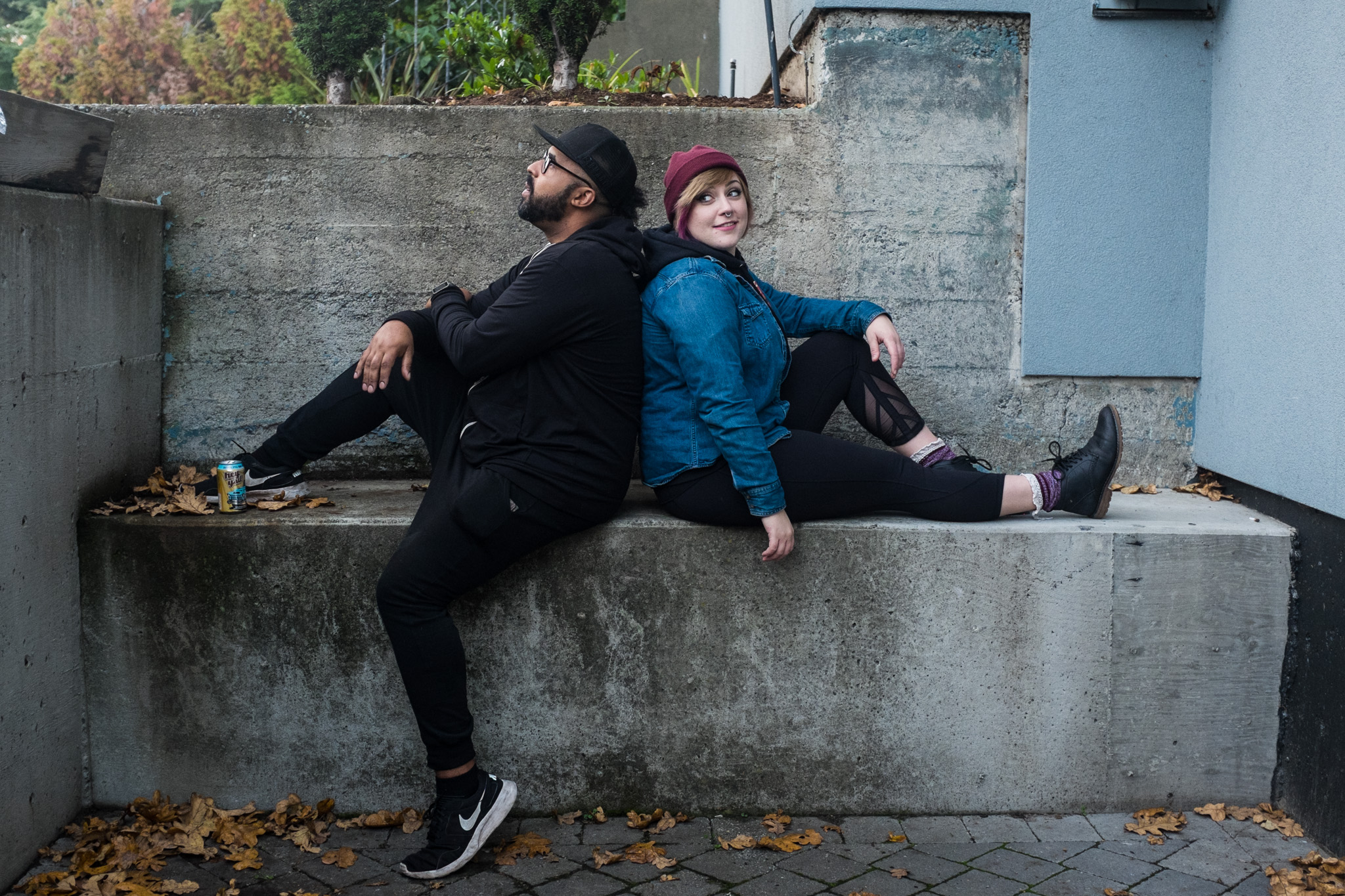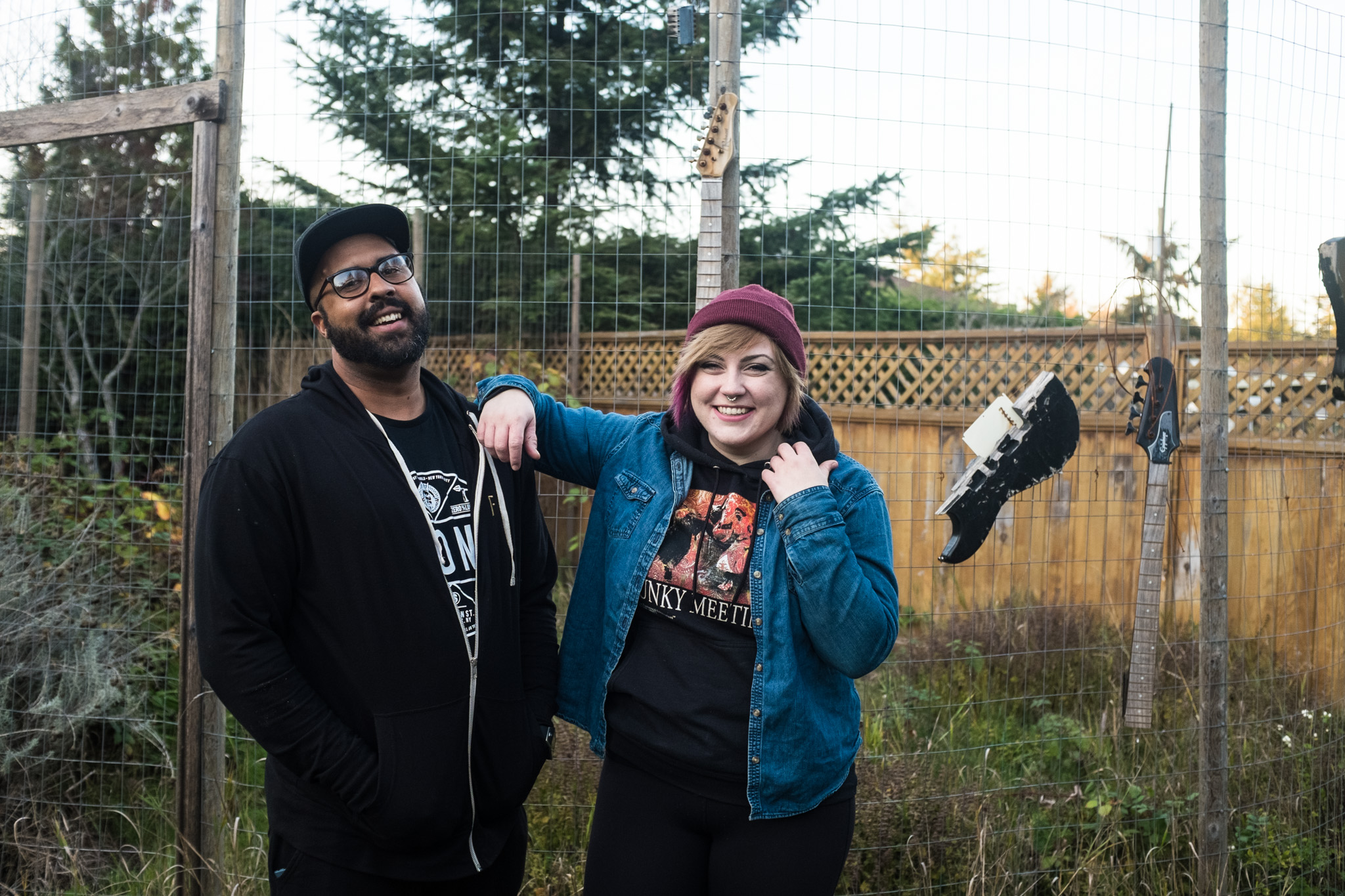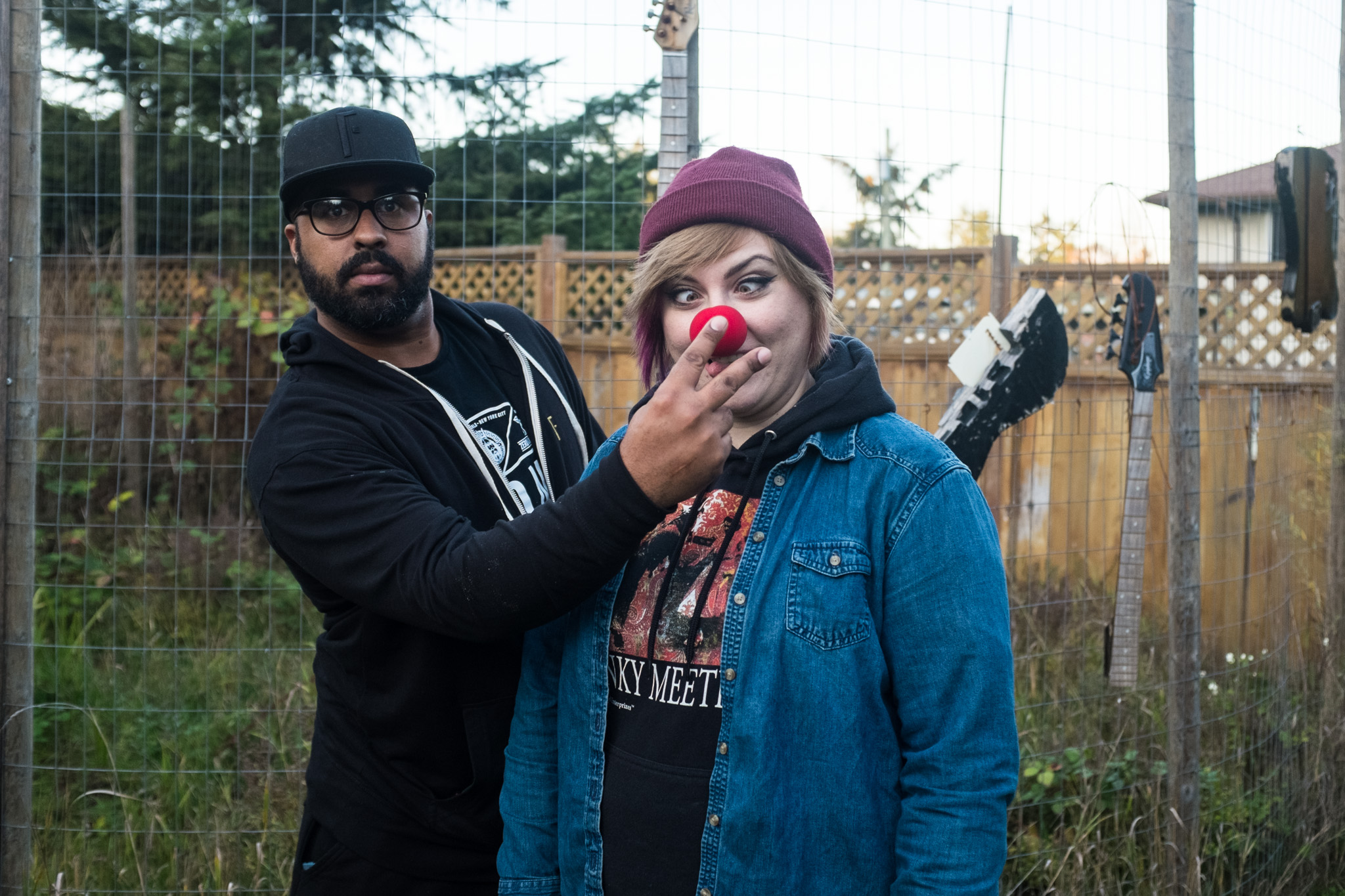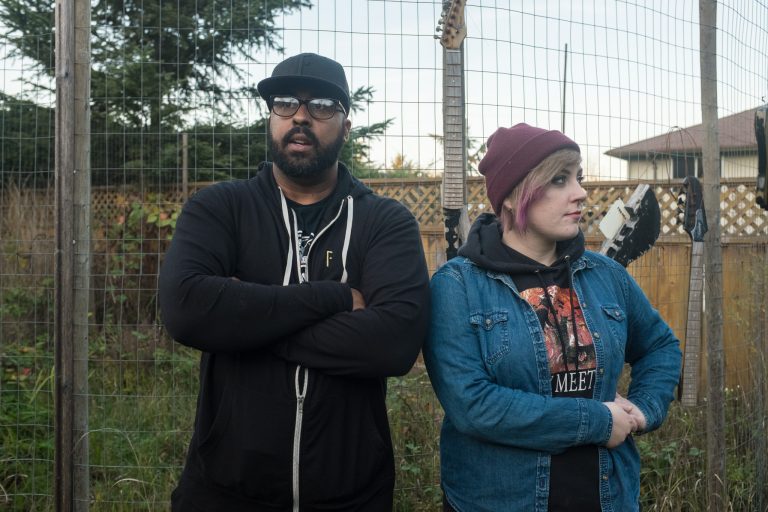
On a misty Saturday afternoon near UVic, we sat down in the comfort of a recording studio with The New Groovement’s latest front-people, Steph Wisla and Shane Battley, for an engaging and winding discussion about race, motivation, and their upcoming show at Lucky Bar.
—————————————————————————————————————————–
Dallas Ross: First of all — because we now have to pretend like we’ve just started talking — thanks for taking the time to meet with me.
Shane Battley: Of course
Steph Wisla: Absolutely.
DR: I did a little research into The New Groovement and I had a hard time pinning down exactly what it was I was looking at. It’s a huge group and every video that I found on YouTube seems to have a somewhat different collection of people in it. Can you explain to me what exactly The New Groovement is and how it’s able to function with so many people?
SW: Great question.
SB: From my point of view, the way I’ve looked at The New Groovement is that there’s a core selection of people who wanted to create this format that— I remember when I was just rapping in basements with my friends, we heard about this idea and, in the back of my mind, I was like, “Someone’s finally doing this. That’s genius.” Putting a singer and a rapper in the same band, there’s isn’t much like that in the lexicon of hip hop.
SW: Except for the six in Victoria. *laughs*
SB: Well, that’s the thing. Since The New Groovement started, it created this amazing scene of musicians that were like, “That formula works. Let’s put it together and make it work.”
What I find interesting about The New Groovement is that, because there are so many pieces to it, pieces can be interchanged, and it can only improve the situation.
I remember when they were auditioning people to replace the old singer, I met Stevie (Steph) selling merch at one of their Lucky shows and she was super jazzed on the whole thing and she knew all the words and I was like, “Sweet!” because we shared that.
SW: From fan to front man.
SB: Yeah!
DR: So, you both have that in common. Starting as fans and becoming a part of the band over time?
SW: Yeah, that’s exactly what happened.
To answer your question from my perspective, The New Groovement is a collection of people who want to play funk music. It started at someone’s basement jam and it’s been six and a half years since the start of the band. Since then, there’s been interchanging members, but it’s always been for the same reason of wanting to play music with your friends.
DR: You guys are a huge group and there are other, similar groups in town. Do you find that you end up competing with each other?
SW: It’s not really a competition. It’s this thing where all these super-talented musicians are all stoked on each other’s music and, because of that, they are kind of interchangeable.
Greg, for instance, he’s in The Leg Up Program, New Souls, and Downtown Mischief. He’s in all these different bands with us because he’s passionate about making music with his friends. And that’s really all anyone’s doing. It’s a great big friend group.
SW: I don’t really think you could run out of resources because there are just so many amazing musicians in town. Alex Scram from The Leg Up Program once described the funk music scene in Victoria like ’90s grunge in Seattle. Everyone is doing it, so you may as well not compete; just support each other.
DR: And, in a city this size, you don’t find that you’re even competing for gigs?
SW: Yeah, gigs maybe.
I joke with the people in The Leg Up Program, like, “Oh sweet! You guys got that festival. Now we know we’re not going to. We got this one, so we know you’re not going to be there.” *laughs*

DR: Shane, a lot of people around the city know you as the Hip Hop Karaoke guy. I was hoping you could touch a little bit on that. How did that get started?
SB: Vancouver has had a Hip Hop Karaoke for about six years, and I was aware that I was always interested in that idea. I’m super connected to Lucky Bar — it’s like my home — and whenever I can, I go to Dylan the owner with an idea and I just go, “Hey! Let’s do this thing” and he’ll go, “Sure, let’s try it out.” They always have Wednesdays and Thursdays open, and I had the idea of trying to bring Hip Hop Karaoke to Victoria.
The first time we did it, it wasn’t called Hip Hop Karaoke. It was called “Da Mix,” like that show from Much Music?
DR: Yeah.
SB: And I had a screen on stage and I was cheating all the different ways, but I just wanted to make something happen. That night, DJ Low came, and he said that he’d been wanting to get turntables again and he offered to be my DJ and I’d host. And I was like, “That’s perfect!” And we’ve been doing it for four years now.
DR: Victoria is not necessarily known for being the most diverse city.
SB: No.
DR: So, is it problematic to have, what I imagine is, a bar made up mainly of white college kids…
SB: 100%
DR: …getting up on stage and getting really excited to say the N-word in front of all of their friends?
SB: Okay, I’m probably going to get in a lot of trouble because I haven’t been able to go on the record about this and I will go on the record about this.
The original Hip Hop Karaoke in New York won’t let anyone say the N-word. Black, white, doesn’t matter, no one can say it. I have a different philosophy about hip hop. Hip hop culture has a vernacular and anyone who wants to participate in that culture has a level of allowance to use the vernacular. When learning a different culture’s language, you’re going to use the slang and everything else.
Oddly, the N-word to me as a black dude, I’m one of those all or nothing people. Either we all can do it or we can’t. I don’t use it my music and I don’t think it’s a word that should be used in rap culture because rap culture doesn’t want white people to use it but white people are still going out and buying rap culture, you know what I mean? Hip hop is in the popular culture in large part to white people embracing it. So, in my view, if it’s in the context of the song, go for it.
Like, with that Kendrick Lamar thing where he had a white girl on stage and she said it and he flipped out, that’s super bad taste. He shouldn’t have it in his music if he doesn’t want people to say it. If you’re going to put it out there, you can’t be mad at what comes back.
DR: So, if they’re going to put it out there to a consumer base that is multi-racial, you don’t think they can control how that consumer base is going to respond to their music?
SB: Yeah, exactly. If you’re relegating a white dude to the privacy of his car to be able to say whatever he wants in the song that he loves, then you’re taking away a part of what he loves and, to me, that is the antithesis of art. It’s the opposite of art to say, “Here’s this thing but don’t appreciate it for what it is. Appreciate it for what I say you’re allowed to think it is.”
SW: Okay, I have a question for you, then. If there was some white girl that plays hip hop music, would it be appropriate for her to use it?
SB: In original raps? No.
SW: It’s okay within that song, but just because you’re playing hip hop does not mean you can write that kind of hip hop song?
SB: No, and that’s the separation. You’re not black because you make hip hop, but you can appreciate black culture if you appreciate hip hop culture.
SW: But appreciating hip hop culture does not automatically mean you that you get to use the N-word.
SB: No. It’s doesn’t mean that you’re a black person by any means.
SW: That’s where it can get fuzzy for some people, though, because black culture and hip hop culture are two different things but with overlying things.
DR: You guys play funk and soul and hip hop which are all considered historically black music. Is this appropriation of black culture, to have a bunch of white people playing historically black music?
SB: Not at all, because that’s like saying hip hop is an appropriation of black culture. Like saying baggy jeans are appropriating black culture. That would be like me saying Native rappers are appropriating black culture, you know? It just doesn’t translate anymore when you start getting into that kind of stuff.
SW: It’s the difference between appropriation and appreciation.

DR: I do kind of want to talk about this whole interview got started.
SW: Yep.
DR: A few months ago, I did an interview with the guy from Victoria Bar Memes and there was someone commenting on it and it was the most comments I’ve ever seen on anything I’d written.
SW: And it was super positive.
DR: Well, it wasn’t super positive.
SW: *laughs*
DR: But, I also didn’t think you had an invalid argument. Your argument was that we should spend more of our time promoting local artists.
SW: Real artists. Not meme artists.
DR: Well, art is in the eye of the beholder. But, where do you think we’re failing as a local media to promote local artists.
SW: Failing is a pretty strong word. I just think there are so many amazing artists here that aren’t getting noticed. For example, The New Souls play almost every week at Canoe and I don’t think I’ve ever seen them be interviewed or anything. It’s not necessarily the media failing us, it’s just so easy to focus on the next big act that’s coming to town rather than seeing what’s at home.
DR: To defend our side a little bit; when the same bands are playing locally every weekend, maybe we do it once, but every single weekend, we’re just not going to talk about the same people every time.
SW: No, and that makes sense. It’s on the artists, too. I kinda reached out to you by trolling your comment feed about not paying enough attention to us and I think maybe it’s on us, too.
DR: Do you think people are working hard enough sometimes? I mean, you put yourself out there. You reached out to me. I didn’t have to find you.
SW: Yeah, maybe that’s part of it, too. There are bands in town and their whole thing is that they just want to play music with their friends. They don’t care if anyone hears their music. And, I admire that in some ways.
DR: You guys aren’t just in this band. Between the two of you, I could talk to you collectively about five different projects.
SB: Yep.
SW: I have two main bands and tour with other bands in the summer.
DR: And you both have day jobs. So, why keep doing this? What is it about this?
SW: This is the only thing that matters. Working during the day is just so you can do this.
SB: I really want to make my passions work for me. I have a business that’s time consuming, energy consuming, life consuming, but I’ve been making music for so long that it’s almost impossible for me to get away from it.
SW: It’s so easy as a musician to feel selfish, especially when you’re the front person of a band. Like, am I just doing this because I’m a middle child and I want more attention? Probably, yes. A little bit. But it’s not just that. I feel like I need this. I feel like I’d go crazy if I wasn’t making music.
SB: But, in the end, there may be a payoff or there won’t. But, as long as you’ve got to create the art you’ve created…
SW: It fills your soul.
DR: Tell me about the show on the 23rd.
SW: Lucky Bar. We’re teaming up with Blackwood Kings and Mt. Doyle. It’s going to be super fun.
SB: The downside of all of the changes we’ve had is that it’s kinda of created this “What’s going to happen” view with the rest of the community. Everyone’s kind of looking to see if we’re going to make new music and what kind. So, the idea has been to create some new tunes and phase out the original music.
SW: And showcase the new talent. New rapper, new drummer, new sound.
DR: For people who are familiar with The New Groovement to this point, what should they expect from the show on the 23rd?
SB: A little bit more engagement. This new group has put a lot of time and effort into being super present and raising the entertainment level.
SW: And our sound is changing quite a bit. With so much change within the band, we’re starting to write songs that don’t require all the horns.
That was a big thing with The New Groovement. There was a rapper and a singer and that’s cool, but they have this massive horn section. And now we’re writing music that is still really powerful and engaging without the necessity of having everyone there. It’s just getting unrealistic to only write music that’s only going to sound good if everyone’s there.
The sound is just shifting, but in a really positive way, I think. We’re slightly cooler than we have been in the past.
You can check out the new The New Groovement at Lucky Bar on November 23rd.

